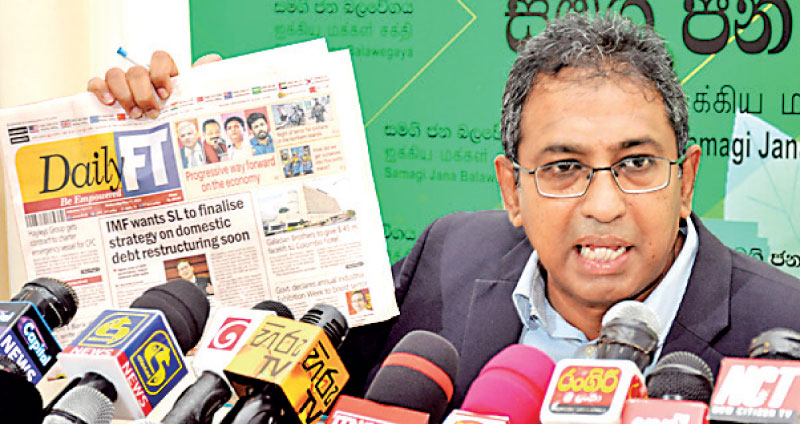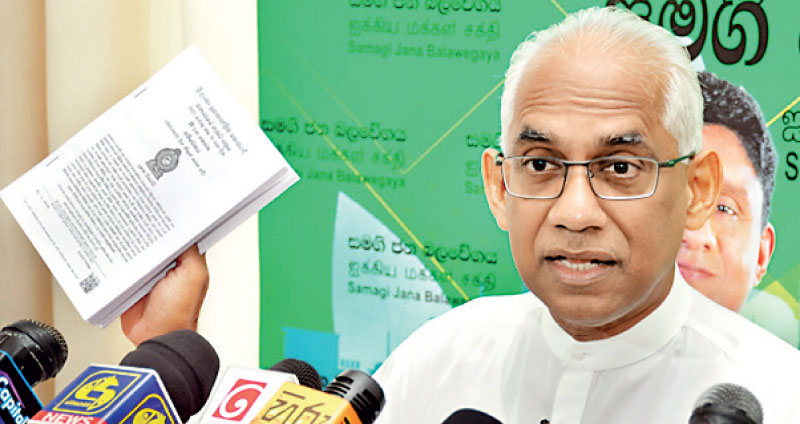Thursday Feb 19, 2026
Thursday Feb 19, 2026
Thursday, 18 May 2023 04:55 - - {{hitsCtrl.values.hits}}

SJB MP Dr. Harsha de Silva shows off yesterday’s copy of Daily FT article during the media briefing yesterday

SJB MP Eran Wickramaratne gestures during the media briefing yesterday
By Darshana Abayasingha
The main opposition, Samagi Jana Balawegaya (SJB), yesterday said the IMF program will help stabilise the economy, but the Government must have a plan to grow the economy or else it would once again face dire circumstances.
Speaking to media yesterday MP Dr. Harsha de Silva said the IMF projects economy to grow at about 3% by 2027 and 2028, and stated this simply wasn’t enough and the economy must grow by 6% to 9% by that time. For this to happen, reforms are critical and these reforms must have the broader understanding and acceptance of the public, which requires a government with a proper mandate from the people, he said.
“The IMF does not get involved with internal politics”, the MP said, but pointed to a quote from IMF Representative, Krishna Sirinavasan in the Daily FT Wednesday edition, the MP stated that it could be interpreted the IMF feels the same.
“There is no focus in this program to enhance growth. We met with the IMF last week and they understood our perspective. We cannot create jobs in an economy growing at 3%, for that it must be grow at about 6% to 9%. A Government will not be able to take the pressure the public will pose in a scenario like that. So, this program needs to change and pick up gear after a year. What are these amendments? Who will make them? and does that need a mandate?”, de Silva said.
The MP said the Domestic Debt Restructuring program is a hot topic these days and a focus of the IMF, but noted international creditors are pushing for domestic haircuts.
Alluding to a discussion between the Government and the Paris Club last week, where China was an observer, de Silva said there was no mention of local banks for the domestic haircut, but the EPF fund had become the focal point of the discussion.
The SJB MP said the EPF fund has already taken a hit of over 30% in dollar terms over the past two years, and had the Government gone to the IMF for assistance in 2019 the country need not have to discuss using worker’s savings to pay off debts. “This is a sad situation,” de Silva stated, adding that any efforts to proceed needs deep discussion and public opinions sought.
Joining the discussion, SJB MP Eran Wickremaratne, said despite the measures to stabilise the economy that are sponsored by the IMF, this would also cause some contraction of the economy that would result in job loss.
He added there are many calls to enhance foreign and local investment in the country, but to create a conducive environment the country must take concrete steps to stamp out corruption.
Pointing to recent events, Wickremaratne asked how a country couldexpect foreign investment when there is no justice or rule of law.
The SJB MP pointed to the draft Anti-Corruption Bill that is being presented in parliament, where in article 119 it is stated that if an allegation is made and found to be false, persons making the allegation are liable to pay damages of up to Rs. 10 million or face a prison term of up to 10 years, or both.
“What kind of regulationis that? It completely devalues the purpose of whistle blowing. What on earth is this? You bring anti-corruption laws to catch people who have engaged in corruption. This is a law about silencing the whistle-blower. They bring laws but they are not designed to catch crooks. There also has to be an independent authority to handle litigation,” Wickremaratne added.
Reiterating his call to make the Commission to Investigate Allegations of Bribery or Corruption independent and for asset declarations by politicians and senior public officials, Wickremaratne also called for amendments to VAT and the special commodity levy in parliament, as earning and expenditure must be approved by people’s representatives.
He noted the Minister of Finance exercises too much power and pointed to the sugar scam where a Rs. 50 tax per kilo of sugar was reduced to 25 cents overnight allowing vested parties to gain.
Pix by Lasantha Kumara